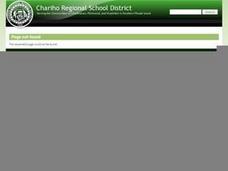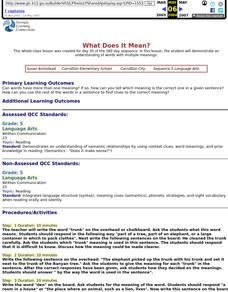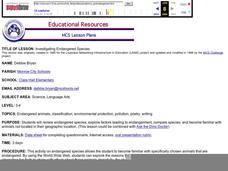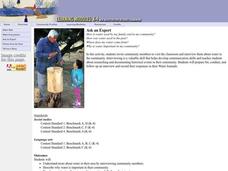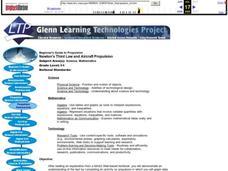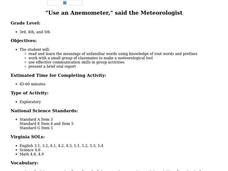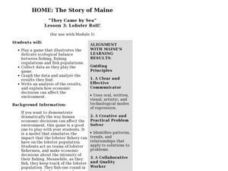Curated OER
How We Have Changed!
First graders practice using their writing skills. They create memory books through the use of daily journal writing questions of the day. Students respond to story prompts and write autobiographies of themselves and another classmate.
Curated OER
Growing a Winter Garden
Second graders listen to a planting story as read by their teacher. Using the text, they summarize the events and complete a KWL chart. They point to the vegetable after it was planted in the garden in the story. They practice using new...
Curated OER
What Does It Mean?
Students demonstrate an understanding of words with multiple meanings. They give the meaning for each "trunk" in the sentence.
Curated OER
Investigating Endangered Species
Students pick an endangered animal to research and report their findings to the class.
Curated OER
Ask An Expert
Young scholars invite community members to visit the classroom and interview them about water in the community. Students prepare for, conduct, and follow up an interview and record their responses in their Water Journals.
Curated OER
Toward Civilization
Learners are asked to define the term civilization. They work in small groups, each group is given the option of researching either the Neanderthal civilization or that of ancient Egypt. Students apply their definition to two different...
Curated OER
Worm Bin Project Data Exchange
Students work collaboratively to exchange data with their peers (groups of students at other schools) about their worm bin project. They discuss differing findings and hypothesize reasons for these differences.
Curated OER
Newton's Third Law and Aircraft Propulsion
Students research propulsion, graph data, and interpret the results.
Curated OER
Imaginative Picture Writing
Learners create a book about clouds after the teacher reads the book, "It Looked Like Split Milk".
Curated OER
What Are the Ethical Considerations
Students investigate the socioeconomic and environmental issues associated with radon. They examine the laws that exist in New Jersey that pertain to real estate. They work in groups to design new legislation that addresses associated...
Curated OER
My Spacecraft Model
Students work together to develop their own model of a spacecraft. They complete illustrations and writings to document their work. They present their information to the class.
Curated OER
Outdoor Explorations: Mystery Plot Vacant Lot
Students utilize observations skills as they work together in groups to solve a mystery. They discuss and perform strategies to solve mysteries that occurred on a vacant lot. Students use a field guide to identify plants and animals...
Curated OER
Passport to the Eastern Hemisphere
Seventh graders create a time line of significant dates in the history of their nation. This requires students to examine the entire history of a country and make informed judgments based on their historical knowledge.
Curated OER
Fahrenheit vs Celsius
Students make a thermometer and write a paragraph about how they did it.
Curated OER
"Use an Anemometer," said the Meteorologist
Students participate in an hands-on construction of an instrument to measure wind speed.
Curated OER
Creating Laws
Students brainstorm ideas for legislation and present their ideas to the class. They draft a bill and take it through the normal procedures of the Canadian Parliament.
Curated OER
Comparative Stream Quality
Students examine water quality on a nearby stream. They collect water samples and test for various factors, including any contamination from the treatment plant, and present their information in a Powerpoint presentation.
Curated OER
Air Pressure is Powerful
Students construct a barometer and collect data on the changes in air pressure. They work is small groups using plastic tubing, corks, and green food coloring. They then use a formula to convert inches of mercury to barometric pressure...
Curated OER
"Use an Anemometer," said the Meteorologist
Students work in groups to make an instrument the Meteorologists use to measure the speed of the wind after the teacher reads them a poem about the wind. Students then review vocabulary that they studied from their lesson plan.
Curated OER
Touring the Museum
Second graders create a living sculpture using their peers. Working with a partner, they manipulate their partner's arms and legs to create a living statue. They create a story to go along with their sculpture, explaining what the...
Curated OER
Humpty Dumpty Webquest
Young scholars explore and dramatize the nursery rhyme "Humpty Dumpty." They explore a variety of nursery rhyme websites, and listen to, dramatize, and recite Humpty Dumpty. Students also answer comprehension questions and sequence the...
Curated OER
Lesson 5: Publication After the Interview
Students lear about the publishing/writing process such as the outline, rough draft, MLA Guide for listing sources, and evaluating, revising, and proofreading.
Curated OER
Wacky Weather Stories
Students observe, identify and creatively express their ideas through literature and dramatize an original story that features a type of weather in the plot.
Curated OER
Lesson 3: Lobster Roll!
Students play a game that illustrates the delicate ecological balance between fishing, fishing regulations and fish populations. They collect data and analyze the results.


